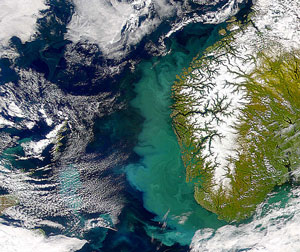Global warming could reduce ocean productivity
Global warming could reduce ocean productivity
Positive feedback effect could further compound climate change
mongabay.com
December 6, 2006
Global warming could cause a rapid overall reduction in marine life resulting from diminished ocean productivity, according to a study published this week in the journal Nature.
The researchers, led by Michael Behrenfeld of Oregon State University, say that the growth of phytoplankton — the basis of the ocean food chain — will likely be reduced by climate change.
“This clearly showed that overall ocean productivity decreases when the climate warms,” said Behrenfeld, a professor of botany and expert on remote sensing of marine biology. “There is significant regional variability, with some areas showing enhanced production and some area losses. But on a global basis there is an inverse relationship — increased temperatures cause decreased marine phytoplankton production.”
The findings are based on a decade-long analysis of satellite data from NASA’s SeaWiFS satellite, which measures phytoplankton by changes in the color of the ocean. More phytoplankton shift the sea color from blue towards green. Ocean phytoplankton generate about half the world’s oxygen through photosynthesis, “a process that removes carbon dioxide from the atmosphere and converts it into organic carbon to fuel nearly every ocean ecosystem,” as explained by a news release from Oregon State University. Compared to land plants, phytoplankton are considerably more productive in removing carbon dioxide from the atmosphere.
 Phytoplankton bloom off the coast of Norway in the Norwegian Sea in 2000. Image provided by the SeaWiFS Project, NASA/Goddard Space Flight Center, and ORBIMAGE. According to a news release from Oregon State University, “the first climate-driven change in ocean production measured in this study occurred between 1997 and 1999, when the oceans were recovering from one of the strongest El Nino events on record. With the end of the El Nino, global climate began to cool and there was a surge in ocean phytoplankton productivity that peaked in late 1999.”
|
“Compared to terrestrial land plants, however, phytoplankton use a very small amount of biomass to convert large amounts of carbon, because they are eaten by predators about as quickly as they grow,” stated the Oregon State University news release. “The entire global phytoplankton biomass is consumed every two to six days, in contrast to land plants that might have turnover rates of a year to hundreds of years.”
“This very fast turnover, along with the fact that phytoplankton are limited to just a thin veneer of the ocean surface where there is enough sunlight to sustain photosynthesis, makes them very responsive to changes in climate,” Behrenfeld said. “This was why we could relate productivity changes to climate variability in only a 10-year record. Such connections would be much harder to detect from space for terrestrial plant biomass.”
The researchers, which also included scientists from the NASA Goddard Space Flight Center, the University of California at Santa Barbara, Princeton University, Rutgers University and the University of Maine, say their work could help us better understand the biological response to global warming and forecast future changes.
“Rising levels of carbon dioxide in the atmosphere are a key part of global warming,” Behrenfeld said. “This study shows that as the climate warms, phytoplankton production goes down, but this also means that carbon dioxide uptake by ocean plants will decrease. That would allow carbon dioxide to accumulate more rapidly in the atmosphere, making the problem worse.”
Reduced ocean productivity could be a positive feedback mechanism that could well worsen global warming, say the researchers.
Beyond the climate impact of reduced ocean productivity, the loss of phytoplankton could adversely affect fisheries and marine ecosystems by cutting the amount of food available to the system. NASA says that changes in phytoplankton growth influence fishery yields and marine bird populations.
Separately, some “geo-engineers” have proposed seeding oceans with iron in an effort to boost phytoplankton populations to help fight climate change. Some scientists have called the concept “risky.”
This article uses quotes from “Global Warming Will Reduce Ocean Productivity” a news release written by David Stauth of Oregon State University.














